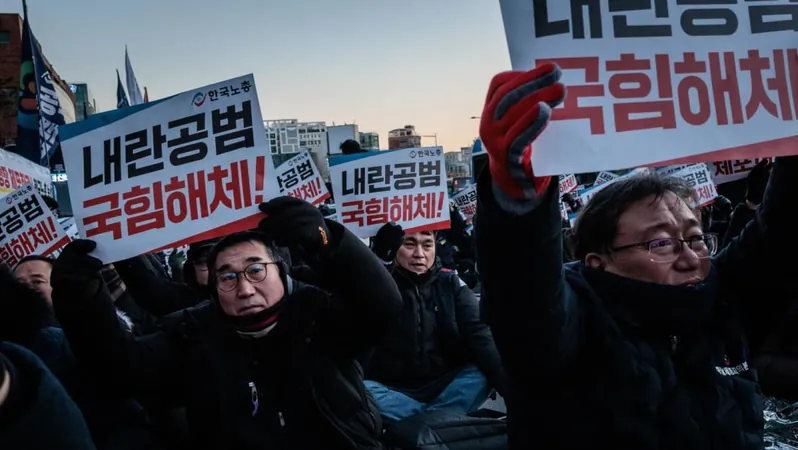
Turmoil in South Korea: Protests Erupt as President Yoon Suk Yeol Faces Potential Arrest
2025-01-11
Author: Mei
SEOUL: A boiling point has been reached in South Korea as thousands of citizens descended on the capital for competing demonstrations over the unjust actions of President Yoon Suk Yeol this Saturday, January 11.
The backdrop? An imminent attempt by investigators to arrest the suspended president following his controversial short-lived decree of martial law, a move that has unraveled into one of the nation's gravest political crises in recent memory.
In a dramatic standoff the previous week, President Yoon defiantly resisted arrest, with his security personnel confronting investigators after Yoon's December 3 power grab triggered widespread public outrage. Citizens are now taking to the streets in frigid temperatures, rallying either for his arrest or to demand that the impeachment proceedings against him be annulled.
Supporters of Yoon brandished national flags, while opponents sported rainbow headbands emblazoned with messages of discontent. Tensions have been escalating in the country ever since Yoon called upon military personnel to storm Parliament, which they did in a failed bid to stop legislators from voting to disband his martial law decree.
"Despite our relentless efforts for justice, he continues to elude accountability," declared Kim Min-ji, a 25-year-old university student participating in the demonstrations. "It is crucial for us to raise our voices until he is forcibly removed from office."
Conversely, Yoon's backers, like 71-year-old Su Yo-hahn, argue that his martial law declaration was justified to combat anti-state elements. "He is someone who was elected by the people and represents our country. Supporting Yoon is to support our nation," Su claimed.
Early morning saw a gathering of Yoon's supporters outside his residence, culminating in a significant rally scheduled for 1 p.m. in downtown Seoul, with anti-Yoon protests set for later in the afternoon. The stakes have never been higher, as Yoon faces grave criminal charges of insurrection—one of the few offenses immune from presidential protections—which could lead to prison time or, in the most devastating scenario, capital punishment.
If the arrest warrant proceeds, Yoon would mark a dark milestone as the first sitting South Korean president to be apprehended. The political fallout has also been exacerbated by the resignation of his security chief, Park Chong-jun, who is embroiled in investigations regarding the aggressive measures taken to protect Yoon from investigators during the tense six-hour standoff.
Meanwhile, amidst strategic barricades and wire installations surrounding Yoon's residence, the Corruption Investigation Office (CIO) has vowed to "prepare thoroughly" for their second attempt to arrest the president, emphasizing that those who obstruct the process will face detention. Reports suggest that a task force of 1,000 investigators may be mobilized in anticipation of the arrest.
Yoon is not only dodging arrest but also contending with ongoing impeachment proceedings. While lawmakers have already suspended him, it will be the Constitutional Court that decides whether this suspension will be upheld or if he will be restored to power. The court is slated to commence Yoon's impeachment trial on January 14, a proceedings that will take place even if he does not appear.
Polls indicate an uptick in approval ratings for Yoon's ruling party, despite the turbulence surrounding his administration. Furthermore, in a separate issue, opposition parties have moved to expel a fellow legislator from the ruling People Power Party for enabling a far-right youth group, the Anti-Communist Youth Corps, to hold a controversial press conference in Parliament. This has only added another layer of complexity to an already fraught political landscape.
As protests continue to unfold, South Korea stands at a crossroads, leaving citizens and political analysts alike wondering what will happen next in this historic showdown.


 Brasil (PT)
Brasil (PT)
 Canada (EN)
Canada (EN)
 Chile (ES)
Chile (ES)
 Česko (CS)
Česko (CS)
 대한민국 (KO)
대한민국 (KO)
 España (ES)
España (ES)
 France (FR)
France (FR)
 Hong Kong (EN)
Hong Kong (EN)
 Italia (IT)
Italia (IT)
 日本 (JA)
日本 (JA)
 Magyarország (HU)
Magyarország (HU)
 Norge (NO)
Norge (NO)
 Polska (PL)
Polska (PL)
 Schweiz (DE)
Schweiz (DE)
 Singapore (EN)
Singapore (EN)
 Sverige (SV)
Sverige (SV)
 Suomi (FI)
Suomi (FI)
 Türkiye (TR)
Türkiye (TR)
 الإمارات العربية المتحدة (AR)
الإمارات العربية المتحدة (AR)